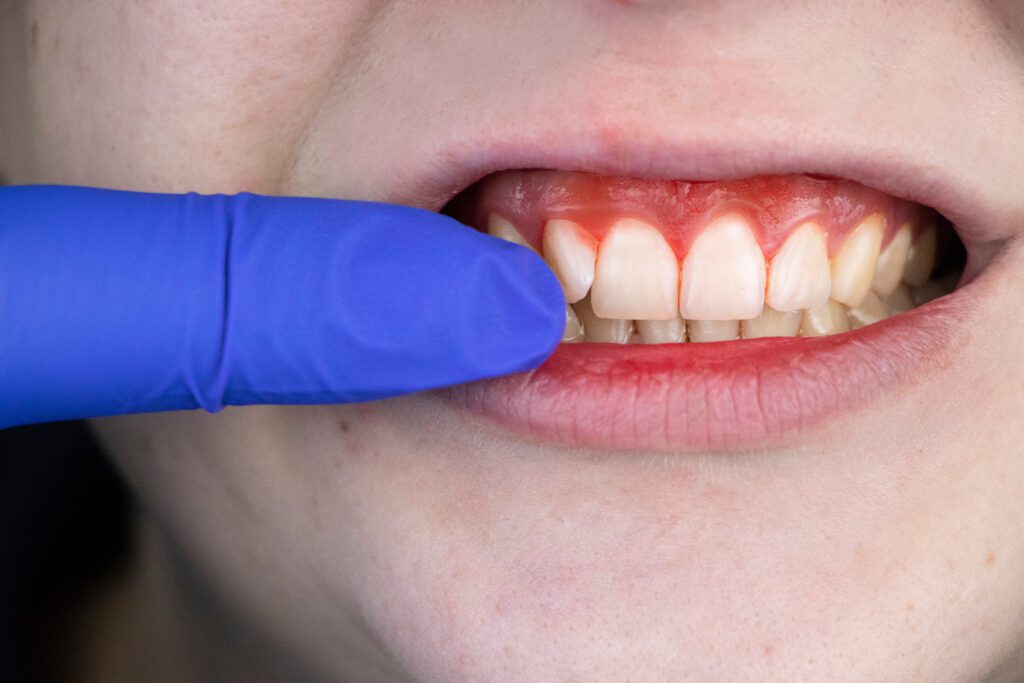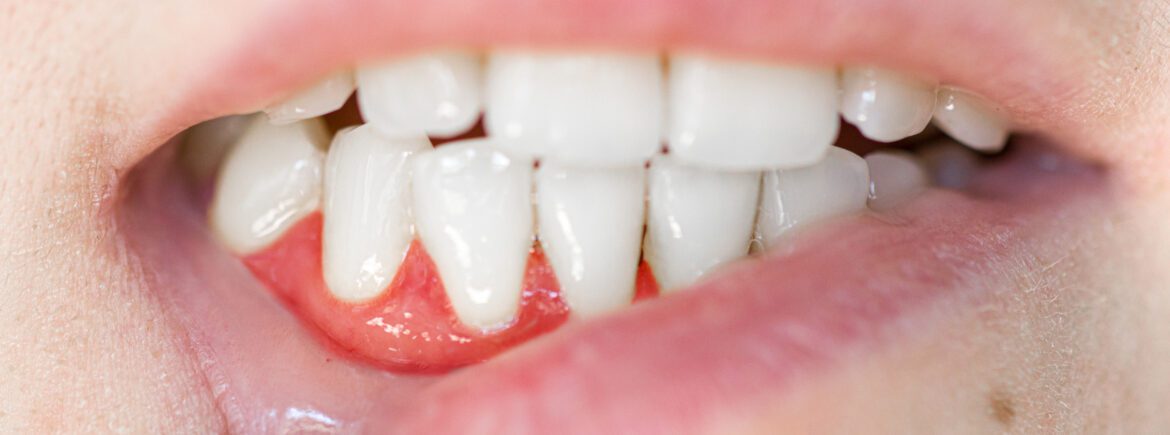The Link Between Gum Disease and Diabetes
Although gum disease is a common dental problem, it may not get the attention it deserves. If left untreated, it can impact not only your oral health but also your overall well-being. Have you ever wondered if there is a possible connection between gum disease and diabetes? In this article, our dentist Perth aims to explain how gum disease and diabetes are linked and why keeping your mouth healthy can also benefit your overall health.

Symptoms of Gum Disease
If you visit your dentist regularly, they can catch early signs of gum disease and prevent them from turning into more significant problems in the future. Below are the symptoms for both the early and late stages of this condition.
Early Symptoms
Bleeding Gums: Bleeding gums are usually the first sign of gum disease. Your gums may bleed when you are brushing or flossing.
Red and Swollen Gums: Red and swollen gums are a sign of inflammation. Your gums may look bright red instead of being a healthy pink.
Bad Breath: Persistent bad breath or a bad taste in your mouth could be early signs of gum problems.
Advanced Symptoms
Receding Gums: Receding gums can cause your gums to pull away from your teeth, which may expose the roots.
Loose Teeth: As gum disease gets worse, your teeth may start to feel loose or shift.
Pain When Chewing: When gum disease gets worse, it can make chewing painful or uncomfortable.
Sensitive Teeth: You may notice that your teeth have become more sensitive to hot or cold foods and drinks.
Exploring the Link Between Gum Disease and Diabetes
Gum disease and diabetes are more connected than many may think.
How Gum Disease Can Influence Blood Sugar Control
When gum disease progresses, it can make it harder to control your blood sugar. The bacteria that cause gum disease can increase inflammation in your body, which can affect your body’s ability to process sugar. If you have diabetes, severe gum disease can lead to higher blood sugar levels, which makes managing your diabetes more difficult. Keeping your gums healthy can help keep your blood sugar levels stable, which is important if you’re managing diabetes.
The Impact of Diabetes on Gum Health
Diabetes can also affect gum health. High blood sugar levels create ideal conditions for infections like gum infections to grow. Therefore, if your blood sugar is not controlled, you are more likely to get gum problems. That’s why it is necessary for people with diabetes to take care of their teeth and gums and see their dentist regularly. Keeping your blood sugar under control can also help stop gum disease from progressing, which is good for both your mouth and your overall health.

Risk Factors for Developing Gum Disease and Diabetes
Knowing the risk factors for gum disease and diabetes can help you prevent and manage both conditions better.
Genetic Predispositions and Lifestyle Factors
Genetics can play a role in your risk of getting both gum disease and diabetes. If these conditions run in your family, you may have a higher risk of developing them. However, your lifestyle choices play a major role in your risk as well. Regular exercise and maintaining a healthy weight can decrease your risk because inactivity and excess weight may elevate your risk.
The Role of Diet in Both Conditions
Your diet and whether you smoke can significantly affect your gum health and your blood sugar. Eating lots of sugary foods and drinks can lead to diabetes and cause gum disease by helping plaque build-up. A balanced diet full of fruits, veggies, and whole grains can help lower your risk of diabetes and gum disease by reducing inflammation and giving your body the nutrients it needs.
The Role of Smoking in Both Conditions
Smoking is another major risk factor. It harms your body’s blood circulation, makes your immune system weaker, and raises your risk of getting infections like gum disease. For people with diabetes, smoking makes it harder to control blood sugar, which can lead to more serious health issues. Quitting smoking can improve your oral health and manage diabetes more effectively.
Measures to Manage Gum Disease and Diabetes
Here’s how you can manage both conditions by taking these proactive approaches:
Regular Check-ups: Visit your dentist and doctor regularly. They can catch early signs of problems and guide you on how to prevent or manage these conditions.
Effective Oral Hygiene: Brush twice a day, floss regularly, and use mouthwash. Maintaining proper oral hygiene can reduce the risk of gum disease.
Control Blood Sugar: If you have diabetes, try to keep your blood sugar under control to prevent gum problems. Stick to your treatment plan and monitor your glucose levels.
Healthy Diet: Eat plenty of fruits, vegetables, and whole grains. Avoid too much sugar, which can worsen both gum disease and diabetes.
Quit Smoking: Smoking increases the risk of many health issues, including gum disease and diabetes. Quitting can improve your overall health significantly.

Frequently Asked Questions
How does diabetes increase the risk of gum disease?
Diabetes can raise blood sugar, which then increases glucose in your saliva. This extra sugar feeds harmful bacteria and causes plaque build-up that can lead to gum disease.
Can treating gum disease improve blood sugar control in people with diabetes?
Taking care of gum disease can actually help you control your blood sugar better. Treating gum infections reduces inflammation, which makes your body respond to insulin more effectively and helps you manage diabetes more easily.
Are people with well-controlled diabetes still at risk for gum disease?
Keeping your blood sugar under control lowers your risk, but people with diabetes are still more likely to get gum disease than those without it. That’s why it’s so important to visit your dentist regularly for dental check up and cleans and maintain good oral hygiene.
What oral health complications can arise from diabetes besides gum disease?
Diabetes can cause several mouth problems, like dry mouth, fungal infections such as thrush, slower healing of sores, and more frequent cavities.
How often should individuals with diabetes visit the dentist?
People with diabetes should see their dentist at least twice a year. In some cases, depending on their health conditions, they may need to visit their dentist more frequently.
Can children with diabetes develop gum disease?
Kids and teens with diabetes are also likely to get gum disease. Teaching them good brushing habits early and taking them to the dentist regularly can help prevent problems.
What are the signs of gum disease that individuals with diabetes should watch for?
Symptoms include red, swollen, or bleeding gums, persistent bad breath, receding gums, loose teeth, and changes in bite alignment. If you notice any of these, it’s time to see your dentist right away.
Take Control of Your Health: Schedule Your Consultation Today!
Whether you’re dealing with gum disease, need emergency dental care, wisdom teeth removal in Perth, or just seeking a routine check-up, our dedicated team is ready to support you.
We provide expert care and practical advice tailored to your needs, helping you maintain both your oral and overall wellness.
Acts Dental is proud to be a HBF preferred provider, HCF preferred provider, NIB preferred provider, Bupa preferred provider, and Medibank preferred provider dentist in Perth.
Don’t wait to take the next step towards a healthier life—reach out now (08) 9474 5083 to make an appointment and see how we can help you achieve your health goals.


